抑郁症英文介绍教学文案
- 格式:doc
- 大小:69.00 KB
- 文档页数:8
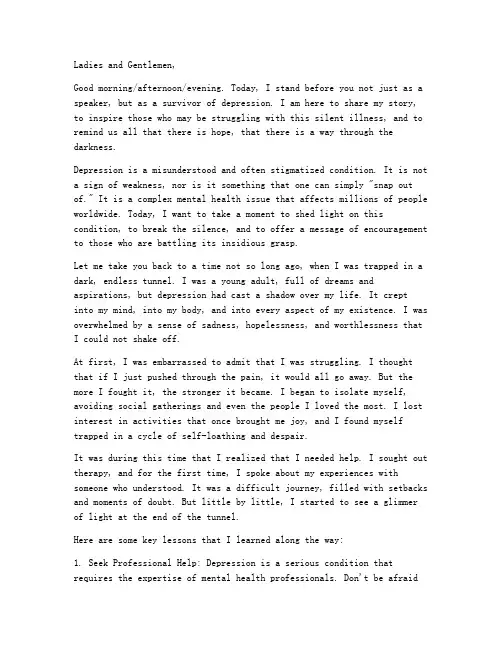
Ladies and Gentlemen,Good morning/afternoon/evening. Today, I stand before you not just as a speaker, but as a survivor of depression. I am here to share my story, to inspire those who may be struggling with this silent illness, and to remind us all that there is hope, that there is a way through the darkness.Depression is a misunderstood and often stigmatized condition. It is not a sign of weakness, nor is it something that one can simply "snap out of." It is a complex mental health issue that affects millions of people worldwide. Today, I want to take a moment to shed light on this condition, to break the silence, and to offer a message of encouragement to those who are battling its insidious grasp.Let me take you back to a time not so long ago, when I was trapped in a dark, endless tunnel. I was a young adult, full of dreams and aspirations, but depression had cast a shadow over my life. It creptinto my mind, into my body, and into every aspect of my existence. I was overwhelmed by a sense of sadness, hopelessness, and worthlessness that I could not shake off.At first, I was embarrassed to admit that I was struggling. I thought that if I just pushed through the pain, it would all go away. But the more I fought it, the stronger it became. I began to isolate myself, avoiding social gatherings and even the people I loved the most. I lost interest in activities that once brought me joy, and I found myself trapped in a cycle of self-loathing and despair.It was during this time that I realized that I needed help. I sought out therapy, and for the first time, I spoke about my experiences with someone who understood. It was a difficult journey, filled with setbacks and moments of doubt. But little by little, I started to see a glimmer of light at the end of the tunnel.Here are some key lessons that I learned along the way:1. Seek Professional Help: Depression is a serious condition that requires the expertise of mental health professionals. Don't be afraidto ask for help, and don't give up until you find the right support system for you.2. Surround Yourself with Support: Reach out to friends, family, or support groups. Sharing your experiences with others who understand can be incredibly empowering and healing.3. Practice Self-Care: Take care of your physical and emotional well-being. This includes getting enough sleep, eating a balanced diet, exercising regularly, and engaging in activities that bring you joy.4. Acceptance: Accept that depression is a part of your life, but it does not define you. Embrace the journey of healing, knowing that each step forward is a step away from the darkness.5. Have Hope: Believe that there is a brighter day ahead. Hold onto the hope that you will find the strength to overcome this challenge and emerge stronger on the other side.Ladies and Gentlemen, my story is just one of many. There are countless individuals who are silently suffering from depression, and it is time for us to come together and support one another. We need to create a culture of empathy and understanding, where people feel safe to share their struggles and seek help without fear of judgment.In the words of Winston Churchill, "If you're going through hell, keep going." This journey is not easy, but it is possible. You may feel like you are walking alone, but I want you to know that you are not. There are people who care about you, who believe in you, and who are willing to help you find your way back to the light.To those who are struggling with depression, I want to say this: You are not alone. You are not a failure. You are a brave soul who is fighting a difficult battle. Your life has value, and you have the strength to overcome this. Keep fighting, keep hoping, and keep believing thatbetter days are ahead.In conclusion, let us break the chains of depression together. Let us support one another, educate one another, and create a world wheremental health is a priority. Let us stand up against the stigma, and let us celebrate the triumphs of those who have fought and won the battle against depression.Thank you for listening. Together, we can make a difference. Together, we can create a world where everyone has the chance to live a life of happiness and fulfillment.God bless you all.。
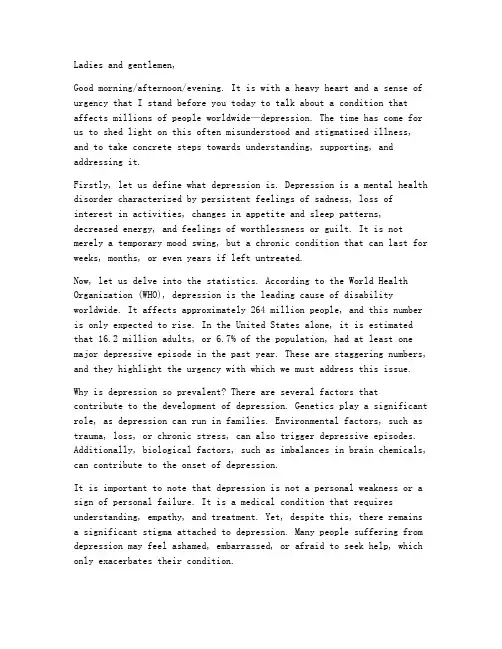
Ladies and gentlemen,Good morning/afternoon/evening. It is with a heavy heart and a sense of urgency that I stand before you today to talk about a condition that affects millions of people worldwide—depression. The time has come for us to shed light on this often misunderstood and stigmatized illness, and to take concrete steps towards understanding, supporting, and addressing it.Firstly, let us define what depression is. Depression is a mental health disorder characterized by persistent feelings of sadness, loss of interest in activities, changes in appetite and sleep patterns, decreased energy, and feelings of worthlessness or guilt. It is not merely a temporary mood swing, but a chronic condition that can last for weeks, months, or even years if left untreated.Now, let us delve into the statistics. According to the World Health Organization (WHO), depression is the leading cause of disability worldwide. It affects approximately 264 million people, and this number is only expected to rise. In the United States alone, it is estimated that 16.2 million adults, or 6.7% of the population, had at least one major depressive episode in the past year. These are staggering numbers, and they highlight the urgency with which we must address this issue.Why is depression so prevalent? There are several factors thatcontribute to the development of depression. Genetics play a significant role, as depression can run in families. Environmental factors, such as trauma, loss, or chronic stress, can also trigger depressive episodes. Additionally, biological factors, such as imbalances in brain chemicals, can contribute to the onset of depression.It is important to note that depression is not a personal weakness or a sign of personal failure. It is a medical condition that requires understanding, empathy, and treatment. Yet, despite this, there remains a significant stigma attached to depression. Many people suffering from depression may feel ashamed, embarrassed, or afraid to seek help, which only exacerbates their condition.So, what can we do to combat this stigma and help those affected by depression? Here are some suggestions:1. Educate ourselves: By understanding the signs and symptoms of depression, we can recognize it in ourselves and others. This knowledge is the first step towards addressing the issue.2. Speak openly: It is crucial to talk about depression, just as wewould with any other medical condition. Open dialogue can help break down the stigma and encourage those suffering to seek help.3. Support those affected: Be there for friends, family, and colleagues who may be struggling with depression. Offer a listening ear, understanding, and, if necessary, encourage them to seek professional help.4. Encourage professional help: If someone you know is suffering from depression, encourage them to seek help from a mental health professional. Treatment can vary from therapy to medication, and a professional can help determine the best approach for each individual.5. Advocate for mental health: Advocate for better access to mental health services, more research into depression, and policies thatsupport those with mental health conditions.In conclusion, depression is a serious and widespread issue thatrequires our attention. By educating ourselves, speaking openly, supporting those affected, encouraging professional help, and advocating for mental health, we can take significant steps towards addressing this illness. Let us not underestimate the power of compassion, understanding, and action. Together, we can create a world where depression is treated with the same urgency and care as any other medical condition.Thank you for your time and attention. Let us work together to create a healthier, more supportive, and understanding society for all.。
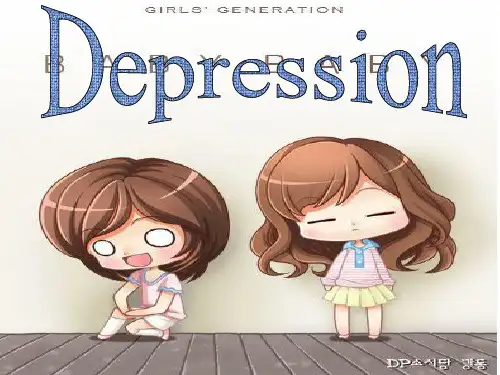
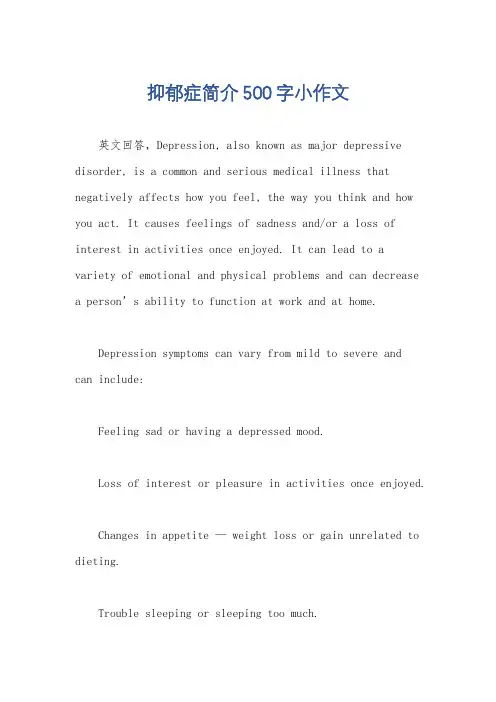
抑郁症简介500字小作文英文回答,Depression, also known as major depressive disorder, is a common and serious medical illness that negatively affects how you feel, the way you think and how you act. It causes feelings of sadness and/or a loss of interest in activities once enjoyed. It can lead to avariety of emotional and physical problems and can decrease a person’s ability to function at work and at home.Depression symptoms can vary from mild to severe andcan include:Feeling sad or having a depressed mood.Loss of interest or pleasure in activities once enjoyed.Changes in appetite — weight loss or gain unrelated to dieting.Trouble sleeping or sleeping too much.Loss of energy or increased fatigue.Increase in purposeless physical activity (e.g., hand-wringing or pacing) or slowed movements and speech (actions observable by others)。

What is depression?什么是抑郁症?This topic covers depression in adults.For information on depression in young people,see the topic Depression in Childhood and Adolescence1.For information on depression following childbirth,see the topic Postpartum Depression.本文探讨的主要关于成年人的抑郁症。
若需查询关于末成人的抑郁症,请查看“儿童和青年人的抑郁症。
产后抑郁症请查看”产后抑郁“。
Depression is a mood disorder2 that causes you to feel sad or hopeless for an extended period of time.More than just a bout3 of the blues4 or temporary feelings of grief or low energy,depression can have a significant impact on your enjoyment5 of life,your work,your health,and the people you care about.抑郁是在一段时间内持续的一种精神絮乱,它让人感觉悲伤,对生活失去希望。
不止发作一次的悲伤心情,或没有精力,抑郁对人们的生活,工作,健康,甚至对周围的人们都会产生很大的影响。
Depression affects people differently.Some feel down for extended periods of time;for others the feelings of depression come and go.If you have short episodes of mild depression,you may be able to continue to work and take care of daily activities.However,if you do not seek some form of treatment for your depression,you are at risk for getting more depressed6 or becoming physically7 ill.In severe cases,depression can cause people to become incapable8 of communicating,unable to do routine activities,or suicidal.In these cases,it is essential to seek medical attention.抑郁对人们的影响是不同的。
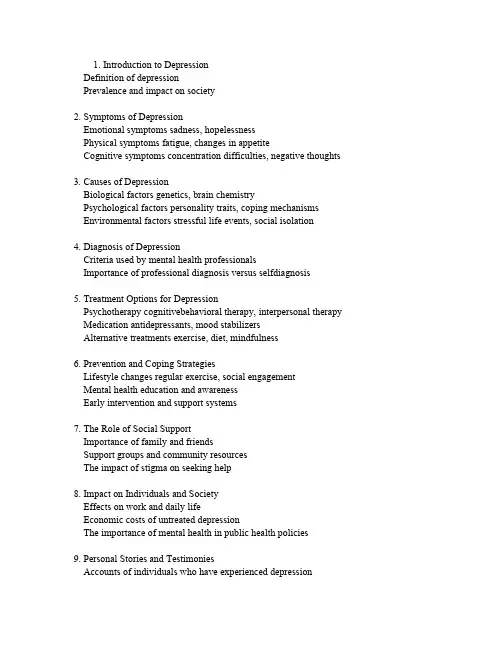
1.Introduction to DepressionDefinition of depressionPrevalence and impact on society2.Symptoms of DepressionEmotional symptoms sadness,hopelessnessPhysical symptoms fatigue,changes in appetiteCognitive symptoms concentration difficulties,negative thoughts3.Causes of DepressionBiological factors genetics,brain chemistry Psychological factors personality traits,coping mechanisms Environmental factors stressful life events,social isolation4.Diagnosis of DepressionCriteria used by mental health professionalsImportance of professional diagnosis versus selfdiagnosis5.Treatment Options for DepressionPsychotherapy cognitivebehavioral therapy,interpersonal therapy Medication antidepressants,mood stabilizersAlternative treatments exercise,diet,mindfulness6.Prevention and Coping StrategiesLifestyle changes regular exercise,social engagementMental health education and awarenessEarly intervention and support systems7.The Role of Social SupportImportance of family and friendsSupport groups and community resourcesThe impact of stigma on seeking help8.Impact on Individuals and SocietyEffects on work and daily lifeEconomic costs of untreated depressionThe importance of mental health in public health policies9.Personal Stories and TestimoniesAccounts of individuals who have experienced depressionThe process of recovery and the role of resilience10.ConclusionRecap of the importance of understanding and addressing depressionCall to action for increased awareness and support for those affected by depression11.Recommendations for Further Reading and ResourcesSuggested books,articles,and websites for more informationContact information for mental health organizations and helplines。


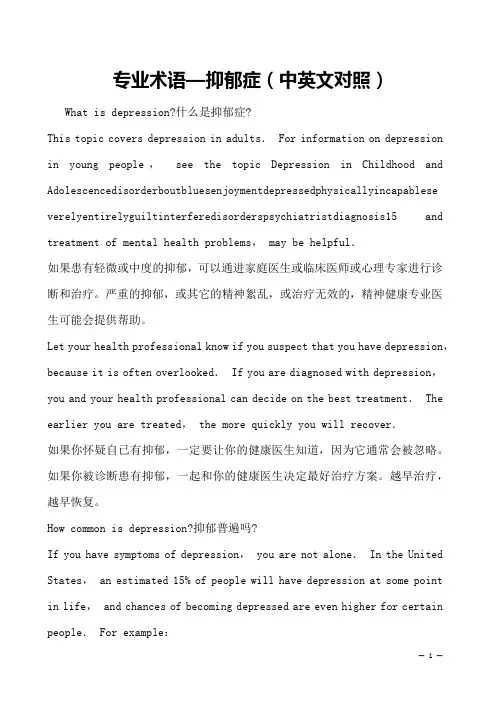
专业术语—抑郁症(中英文对照)What is depression?什么是抑郁症?This topic covers depression in adults. For information on depression in young people,see the topic Depression in Childhood and Adolescencedisorderboutbluesenjoymentdepressedphysicallyincapablese verelyentirelyguiltinterferedisorderspsychiatristdiagnosis15 and treatment of mental health problems, may be helpful.如果患有轻微或中度的抑郁,可以通进家庭医生或临床医师或心理专家进行诊断和治疗。
严重的抑郁,或其它的精神絮乱,或治疗无效的,精神健康专业医生可能会提供帮助。
Let your health professional know if you suspect that you have depression,because it is often overlooked. If you are diagnosed with depression,you and your health professional can decide on the best treatment. The earlier you are treated, the more quickly you will recover.如果你怀疑自已有抑郁,一定要让你的健康医生知道,因为它通常会被忽略。
如果你被诊断患有抑郁,一起和你的健康医生决定最好治疗方案。
越早治疗,越早恢复。
How common is depression?抑郁普遍吗?If you have symptoms of depression, you are not alone. In the United States, an estimated 15% of people will have depression at some point in life, and chances of becoming depressed are even higher for certain people. For example:如果你有抑郁的症状的话,你并不孤单。
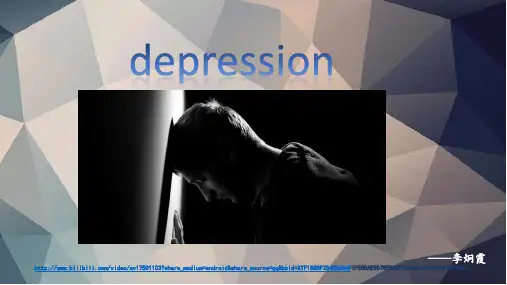
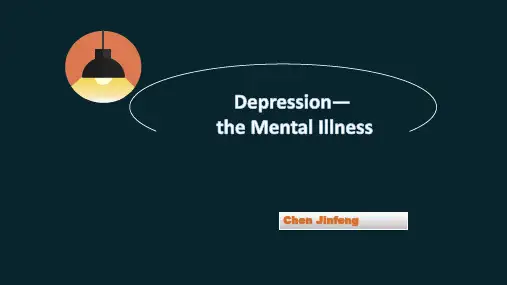
ted抑郁症英文演讲稿Title: Overcoming Depression: My Journey Towards Recovery Introduction:Good morning/afternoon, ladies and gentlemen. Today, I stand before you to discuss a topic close to my heart - depression. Depression, often misunderstood and stigmatized, is a mental health condition that affects millions of individuals worldwide. In this vulnerable and candid speech, I hope to shed light on my personal journey with depression and how I managed to overcome it.Body:1. Personal experience:- Share a brief overview of when and how depression began in my life.- Describe the impact it had on my daily life, relationships, and overall well-being.- Express the feelings of hopelessness, fatigue, loss of interest, and isolation that accompanied my depression.2. Seeking help:- Emphasize the importance of reaching out for support and seeking professional help.- Discuss the initial reluctance and fear I faced when considering therapy or counseling.- Share the importance of finding the right therapist, one who listens, understands, and provides guidance.3. Overcoming stigma:- Address the common misconceptions and stigma surrounding depression.- Stress the need for open dialogue and education to create a supportive environment.- Discuss how societal judgment can hinder recovery and discourage seeking help.4. Self-care and lifestyle changes:- Highlight the significance of self-care, including exercise, healthy eating, and sufficient rest.- Discuss the positive effects of incorporating hobbies or activities one enjoys into daily life.- Share personal experiences of how practicing self-care contributed to my recovery process.5. Building a support system:- Discuss the role of family, friends, and support groups in the recovery journey.- Share how open communication and being vulnerable helped to strengthen relationships.- Encourage listeners to cultivate a supportive network and provide resources for finding support groups.6. Cognitive-behavioral therapy (CBT):- Briefly explain CBT as a widely recognized treatment method for depression.- Highlight how CBT helped me challenge negative thoughts and develop healthier coping mechanisms.- Encourage individuals to explore evidence-based therapies andstress that there is no shame in seeking professional help. Conclusion:In conclusion, depression is a serious mental health condition that affects individuals of all ages, genders, and backgrounds. Through my personal journey, I have learned the importance of seeking help, overcoming stigma, practicing self-care, building a support system, and utilizing evidence-based therapies. I want to urge all of you to spread awareness, be supportive, and never underestimate the power of a listening ear. Together, we can create a world where mental health is understood and treated with empathy, compassion, and respect. Thank you.。
抑郁症自我介绍作文英语Hello, my name is [Your Name], and today I want to share with you a deeply personal aspect of my life that has shaped who I am. This is my story of living with depression.Growing up, I was always the cheerful one, the person who could light up a room with a smile. However, beneath the surface, there was a darkness that began to creep in during my teenage years. It started as a feeling of persistent sadness, a cloud that seemed to follow me wherever I went.As I entered college, the pressure to succeed and the fear of failure magnified these feelings. I found myself struggling to find joy in the things I once loved. The vibrant colors of life seemed to fade into a monotonous gray. My sleep patterns were erratic, and I often found myself either staring blankly at the ceiling or dozing off during the day.Depression is an illness that thrives in silence, and for a long time, I was its silent victim. I felt isolated, even when surrounded by friends and family. The energy it takes to pretend that everything is fine when it's not is exhausting. It's a constant battle to keep up appearances, to not let the truth slip through the cracks.It wasn't until I hit rock bottom that I realized I needed help. The turning point came when I found myself unable to get out of bed for days on end. The thought of facing anotherday felt insurmountable. It was then that I reached out to a counselor, taking the first step towards understanding and managing my depression.The journey to recovery is not a linear path. There are days when the darkness feels overwhelming, and other days whensmall victories, like completing a task or enjoying a momentof laughter, feel like the greatest achievements. Therapy has been a crucial part of my healing process, providing me with tools to navigate my emotions and challenging my negative thought patterns.Medications have also played a role in leveling the playing field, allowing me to have more good days than bad. However,it's important to remember that what works for one person may not work for another. It's about finding the right balanceand treatment plan that suits your individual needs.One of the most significant lessons I've learned is the importance of self-compassion. It's okay to have bad days,and it's okay to ask for help. There is no shame instruggling with mental health, just as there would be no shame in seeking treatment for a physical illness.In sharing my story, I hope to encourage others who may be experiencing similar feelings to know that they are not alone. It's a difficult conversation to start, but it's a necessary one. By talking about depression, we can break the stigma,offer support, and create a community where everyone feels heard and understood.Depression is not a sign of weakness; it's a complex condition that affects millions of people worldwide. Mybattle with depression has been one of the most challenging experiences of my life, but it has also been a transformative one. It has taught me resilience, empathy, and the power of human connection.As I continue on this journey, I am committed to advocating for mental health awareness and to living a life that is authentic and true to who I am. I am [Your Name], and this is my story of depression.。
抑郁症主题的英文演讲稿Depression, a word that carries a heavy weight and is often surrounded by stigma and misunderstanding. It is a topic that is very close to my heart, and today I want to talk to you about the impact of depression and the importance of understanding and supporting those who are affected by it.First and foremost, it's crucial to recognize that depression is not simply feeling sad or down. It is a serious mental health condition that can have a profound impact on an individual's life. It can affect their ability to function on a daily basis, their relationships, and their overall well-being. It is not something that can be easily brushed off or ignored.One of the most important things we can do as a society is to break the stigma surrounding depression. This means creating an environment where people feel safe and supported in seeking help and talking about their struggles. It means understanding that depression is not a sign of weakness, but rather a medical condition that requires treatment and support.In addition to breaking the stigma, it's also important to educate ourselves about depression and its symptoms. Many people who are struggling with depression may not even realize it, or may be hesitant to seek help. By understanding the signs and symptoms of depression, we can better support those who are affected and encourage them to seek the help they need.Furthermore, it's important to emphasize the role of support in helping individuals with depression. Whether it's through therapy, medication, or simply being there to listen, support from friends, family, and the community can make a world of difference for someone struggling with depression. It's important to show compassion and empathy, and to let those who are affected know that they are not alone.Finally, it's important to remember that recovery from depression is possible. With the right treatment and support, individuals can and do overcome depression. It's ajourney that may have its ups and downs, but with the right resources and support, individuals can learn to manage their symptoms and live fulfilling lives.In conclusion, depression is a topic that requires our attention and understanding. It's not something that should be swept under the rug or dismissed, but rather something that we should approach with empathy and support. By breaking the stigma, educating ourselves, and providing support, we can make a positive impact on the lives of those affected by depression. Thank you.。
关于抑郁症的文案英语以下是一些关于抑郁症的英语文案:1. "Depression is a dark cloud that hangs over the brightest days."2. "Depression is not a weakness, it's a sickness. Seek help, and remember, it's okay to not be okay."3. "When you feel like giving up, remember why you held on for so long."4. "Depression is a medical condition, not a weakness of character.It's okay to ask for help."5. "When the world seems dark and hopeless, remember that even the longest night will end with the dawn."6. "When you feel like no one understands, remember that depression is a part of who you are, not who you will be."7. "Remember, it's okay to not be okay. Depression is a part of life, not life itself."8. "You are not alone in this battle. Seek help, and remember, there is always hope."9. "Depression is like a deep, dark hole. But the only way to climb out is to hold onto hope, and remember that it's okay to ask for help."10. "When the pain seems too much to bear, remember that it's okay to let someone else carry the weight for a while."记住,这些只是表达关于抑郁症的一些想法和情感的语句,并不能替代专业的医学诊断或治疗。
抑郁症英文介绍Depression----The Mental Illnesswhat is depressionDepression is a mental health disorder , a psychiatric condition,characterized by sadness ,loss of interest or pleasure, feelings of guilt or low self-worth ,disturbed sleep or appetite ,feelings of tiredness , and poor concentration.Specifically,it is a mood disorder characterized by persistently low mood in which there is a feeling of sadness and lost of interest.Depression is different from the fluctuations in mood that we all experience as a part of a normal and healthy life. Temporary emotional responses to the challenges of everyday life do not constitute depression.According to the US Centers for Disease Prevention and Control (CDC),8% of people over the age of 12 years has depression in any two-week period.The World Health Organization (WTO)puts depression at the top of the list -it is the most common illness worldwide and the leading cease of disability.The organization estimates that 350 million people around the world are affected by depression.Major Depressive disorderMajor depressive disorder(MDD), also known simply as depression, is a mental disorder characterized by at least two weeks of low mood that is present across most situations. It is often accompanied by low self-esteem, loss of interest in normally enjoyable activities, low energy, and pain without a clear cause.People may also occasionally have false beliefs or see or hear things that others cannot.Some people have periods of depression separated by years in which they are normal while others nearly always have symptoms present. Major depressive disorder can negatively affects a person's family, work or school life, sleeping or eating habits, and general health. Between 2-7% of adults with major depression die by suicide, and up to 60% of people who die by suicide had depression or another mood disorder.The cause is believed to be a combination of genetic, environmental, and psychological factors. Risk factors include a family history of the condition, major lifechanges, certain medications, chronic health problems, and substance abuse.About 40% of the risk appears to be related to genetics .The diagnosis of major depressive disorder is based on the person's reported experiences and a mental status examination. There is no laboratory test for major depression. Testing, however, may be done to rule out physical conditions that can cause similar symptoms.Major depression should be differentiated from sadness which is a normal part of life and is less severe.The United States Preventive Services Task Force (USPSTF) recommends screening for depression among those over the age 12, while a prior Cochrane review found insufficient evidence for screening.Typically, people are treated with counselling and antidepressant medication.Medication appears to be effective, but the effect may only be significant in the most severely depressed. It is unclear whether medications affect the risk of suicide. Types of counselling used include cognitive behavioral therapy (CBT) and interpersonal therapy. If other measures are not effective electroconvulsive therapy (ECT) may be tried. Hospitalization may be necessary in cases with a risk of harm to self and may occasionally occur against a person's wishes.Major depressive disorder affected approximately 253million (3.6%) of people in 2013. The percentage of people who are affected at one point in their life varies from 7% in Japan to 21% in France. Lifetime rates are higher in the developed world (15%) compared to the developing world (11%).It causes the second most years lived with disability after low back pain. The most common time of onset is in a person in their 20s and 30s. Females are affected about twice as often as males. The American Psychiatric Association added "major depressive disorder" to the Diagnostic and Statistical Manual of Mental Disorders (DSM-III) in 1980. It was a split of the previous depressive neurosis in the DSM-II which also encompassed the conditions now known as dysthymia and adjustment disorder with depressed mood. Those currently or previously affected may be stigmatized.What are the signs and symptoms of depression? depression may be triggered by stressful life events, other illnesses, certain drugs ormedications, or inherited traits. although causes of depression are not entirely understood, we know it is linked to an imbalance in brain chemistry. once the imbalance is corrected, symptoms of depression generally improvePeople with depressive illnesses do not all experience the same symptoms. The severity, frequency and duration of symptoms will vary depending on the individual and his or her particular illness.Symptoms include:Persistent sad, anxious or "empty" feelingsFeelings of hopelessness and/or pessimismFeelings of guilt, worthlessness and/or helplessnessIrritability, restlessnessLoss of interest in activities or hobbies once pleasurable, including sexFatigue and decreased energyDifficulty concentrating, remembering details and making decisionsInsomnia, early–morning wakefulness, or excessive sleepingOvereating, or appetite lossThoughts of suicide, suicide attemptsPersistent aches or pains, headaches, cramps or digestive problems that do not ease even with treatmentAll of these symptoms can interfere with your quality of life. Even if you don’t have major depression , if you have experience a few of these symptoms for at least two weeks you may have less severe form of depression that still requires treatment.the symptoms of slight and major depressionDepression is a medical condition in which a person feels very sad and anxious and often has physical symptoms.Slight depression could be a portion of major depression, so the criteria for this disease are important to consider and examine for people with the problem. If the depression is only minor, it will not have all of the components of major depression and therefore would be treated differently from themore serious version of the disease.The most common diagnostic criteria are encapsulated in the mnemonic device SIGECAPS. They are in the order of the letters, Sleep problems, lack of Interest, Guilty feelings, lack of Energy, problems with Concentration, Appetite and weight disturbances, Psychomotor retardation, and Suicidal thoughts or actions. If a person has five or six items in this criteria it is very likely that they have major depression and they should be treated for it. If they only have one or two of them they might have a less serious version of the disease, but it still may require treatment. The only difference is that it could be more minor. By asking about these different symptoms, people perform a basic diagnosis test to evaluate themselves or their patients.The symptoms of serious to slight depression may be very debilitating to a patient and identification of the problem is the first step to a full recovery. The condition of depressive disorders is prevalent through all walks of life and it is expected that the majority of persons will experience symptoms of depression at least once in the course of their life. However, since most people experience these symptoms at some point, extended research has been done to determine the best way to treat these specific conditions and many solutions are available to sufferers.To the tissues, which raises the carbon dioxide level, causing general Depression.Associated conditionsMajor depression frequently co-occurs with other psychiatric problems. The 1990–92 National Comorbidity Survey (US) reports that half of those with major depression also have lifetime anxiety and its associated disorders such as generalized anxiety disorder. Anxiety symptoms can have a major impact on the course of a depressive illness, with delayed recovery, increased risk of relapse, greater disability and increased suicide attempts.American neuroendocrinologist Robert Sapolsky similarly argues that the relationship between stress, anxiety, and depression could be measured and demonstrated biologically.There are increased rates of alcohol and drug abuse and particularly dependence,https:///wiki/Major_depressive_disorder - cite_note-34and around a third of individuals diagnosed with ADHD developcomorbid depression. Post-traumatic stress disorder and depression often co-occur.Depression may also coexist with attention deficit hyperactivity disorder (ADHD), complicating the diagnosis and treatment of both.Depression and pain often co-occur. One or more pain symptoms are present in 65% of depressed patients, and anywhere from 5 to 85% of patients with pain will be suffering from depression, depending on the setting; there is a lower prevalence in general practice, and higher in specialty clinics. The diagnosis of depression is often delayed or missed, and the outcome worsens. The outcome can also worsen if the depression is noticed but completely misunderstood.Depression is also associated with a 1.5- to 2-fold increased risk of cardiovascular disease, independent of other known risk factors, and is itself linked directly or indirectly to risk factors such as smoking and obesity. People with major depression are less likely to follow medical recommendations for treating and preventing cardiovascular disorders, which further increases their risk of medical complications.https:///wiki/Major_depressive_disorder - cite_note-38 In addition, cardiologists may not recognize underlying depression that complicates a cardiovascular problem under their care.ManagementThe three most common treatments for depression are psychotherapy, medication, and electroconvulsive therapy. Psychotherapy is the treatment of choice (over medication) for people under 18. The UK National Institute for Health and Care Excellence (NICE) 2004 guidelines indicate that antidepressants should not be used for the initial treatment of mild depression, because the risk-benefit ratio is poor. The guidelines recommend that antidepressants treatment in combination with psychosocial interventions should be considered for:People with a history of moderate or severe depressionThose with mild depression that has been present for a long periodAs a second line treatment for mild depression that persists after other interventions As a first line treatment for moderate or severe depressionLifestylePhysical exercise is recommended for management of mild depression, and has a moderate effect on symptoms. Exercise has also been found to be effective for (unipolar) major depression. It is equivalent to the use of medications or psychological therapies in most people. In the older people it does appear to decrease depression.Exercise may be recommended to people who are willing, motivated, and physically healthy enough to participate in an exercise program as treatment.There is a small amount of evidence that skipping a night's sleep may improve depressive symptoms, with the effects usually showing up within a day. This effect is usually temporary. Besides sleepiness, this method can cause a side effect of mania or hypomania.In observational studies smoking cessation has benefits in depression as large as or larger than those of medicationsRangeMajor depressive disorder affects approximately 253 million people in 2013 (3.6% of the global population).The percentage of people who are affected at one point in their life varies from 7% in Japan to 21% in France.In most countries the number of people who have depression during their lives falls within an 8–18% range. In North America, the probability of having a major depressive episode within a year-long period is 3–5% for males and 8–10% for females.Major depression to be about twice as common in women as in men, although it is unclear why this is so, and whether factors unaccounted for are contributing to this. The relative increase in occurrence is related to pubertal development rather than chronological age, reaches adult ratios between the ages of 15 and 18, and appears associated with psychosocial more than hormonal factors. Depression is a major cause of disability worldwide.People are most likely to develop their first depressive episode between the ages of 30 and 40, and there is a second, smaller peak of incidence between ages 50 and 60.Therisk of major depression is increased with neurological conditions such as stroke, Parkinson's disease, or multiple sclerosis, and during the first year after childbirth.It is also more common after cardiovascular illnesses, and is related more to a poor outcome than to a better one.Studies conflict on the prevalence of depression in the elderly, but most data suggest there is a reduction in this age group. Depressive disorders are more common to observe in urban than in rural population and the prevalence is in groups with stronger socioeconomic factors i.e. homelessness.。